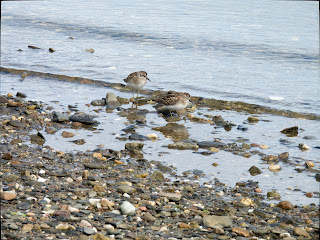NATURE MONCTON NATURE NEWS
August 27,
2023
To respond
by e-mail, please address your message to the information line editor, nelsonpoirier435@gmail.com .
Please
advise both the editor at nelsonpoirier435@gmail.com and the proofreader nicholsl@eastlink.ca if any
errors are noted in wording or photo labelling.
For more information on Nature Moncton, check the website at www.naturemoncton.com .
Edited by
Nelson Poirier nelsonpoirier435@gmail.com
Proofreading
courtesy of Louise Nichols at nicholsl@eastlink.ca
** John Inman sends a duo of
photos of a Tachinid Fly that perched on his window.
John comments, “This fly may be beneficial for garden
pests, but not for butterflies as they lay their eggs on the caterpillars.”
(Editor’s note: Tachinid flies lay their eggs on young
caterpillars, not being too fussy about the species. The eggs hatch, and the
fly larvae (maggots) begin to drink the hemolymph (blood) of the caterpillar.
Just before it pupates, the maggot eats its way out of the caterpillar and
carries on its mission in life.)
**Barbara Smith came across an Opine plant (Hylotelephium
telephium) Monday on the Moncton side of the Riverfront Trail between the Press
Club and the Gunningsville Bridge. The leaves looked thickened and succulent to
Barbara and she does not think she has ever seen one before.
This plant is in the sedum family and is a garden
escapee cultivar.
**Aldo
Dorio photographed a Red Knot at Hay Island on Saturday. More of its kin will likely soon be joining it at this site.
**Nelson
Poirier is going to monopolize today’s edition with photos taken on a visit to
Hay Island at Neguac on Saturday.
The
shorebirds are a big draw this time of year. It was especially interesting to
watch the Ruddy Turnstones doing their thing in the washed-up seaweed
masses tossing the strands about, seeking insects. It was very notable how
camouflaged their plumage allowed them to be. Many Semipalmated Plovers
were present with Semipalmated
Sandpipers and Least Sandpipers among
them. Greater Yellowlegs were present and loud, but their numbers were
not high.
The
beautiful Seaside Goldenrod was at its prime and its striking blooms and
thick succulent leaves were noted. This plant is a very important source of
nectar for late-season insect pollinators and hummingbirds.
Dusty Miller a.k.a. Beach Wormwood was starting to
show its seed clusters as well as Scotch Lovage. Scotch lovage is a
significant food plant for some butterfly species, but no caterpillars could be
found. However, that could be a challenge with hundreds of plants to check!
Our native
non-invasive Phragmites grass (Phragmites australis ssp americanus) was
present to easily distinguish it from the invasive non-native Phragmites grass
(Phragmites australis ssp australis), noting the red areas on the stem and the
less crowded seed head.
It was
pleasant to note Mountain Ash trees loaded with berries which was not
the case last season. Fruit connoisseurs like Bohemian Waxwings and robins will
be pleased.
Tasty blackberries
were noted to provide a delicious woodland snack.
A large Polyphemus
moth caterpillar was temporarily detained for photographs as it crossed a
woods path. It was not impressed with being rolled over on its side for
photographs and shared his thoughts with a distinctly felt bite! It was the
first time Nelson had ever been bitten by a caterpillar, and its wishes were
respected with release to be on its way.
A Seven-spotted
Lady Beetle was encountered. This is one of our non-native lady beetles that
was brought to North America for aphid control and has played a role in
displacing some of our native lady beetles.
Nelson Poirier
Nature Moncton
RED KNOT. AUG 26, 2023. ALDO DORIO


.%20AUG%2025,%202023.%20NELSON%20POIRIER%20(3).jpg)
.%20AUG%2025,%202023.%20NELSON%20POIRIER%20(2).jpg)
.%20AUG%2025,%202023.%20NELSON%20POIRIER.jpg)
.jpg)

.jpg)
.jpg)

.jpg)
.%20AUG%2025,%202023.%20BARBARA%20SMITH.jpg)
.jpg)

.jpg)


.jpg)

.jpg)

.jpg)
.jpg)
.jpg)
.jpg)
%20AND%20LEAST%20SANDPIPER%20(RIGHT)S.%20AUG%2025,%202023.%20NELSON%20POIRIER%20(2).jpg)
.jpg)
.jpg)
.jpg)
.jpg)

.jpg)
.jpg)
.jpg)
.jpg)

